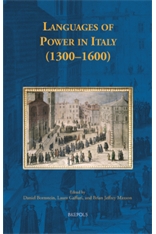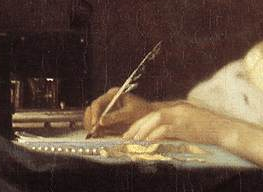Languages of Power in Italy (1300-1600)
Daniel Bornstein, Laura Gaffuri, Brian J. Maxson (éd.)
D. Bornstein, L. Gaffuri, B. J. Maxson (eds.), Languages of Power in Italy (1300-1600) , Brepols, 2017.
A range of contributions discussing the languages of power in medieval and early modern Italy in terms of politics, art, and religion.
The essays in this collection explore the languages – artistic, symbolic, and ritual, as well as written and spoken – in which power was articulated, challenged, contested, and defended in Italian cities and courts, villages, and countryside, between 1300 and 1600. Topics addressed include court ceremonial, gossip and insult, the performance of sanctity and public devotions, the appropriation and reuse of imagery, and the calculated invocation (and sometimes undermining) of authoritative models and figures. The collection balances a broad geographic and chronological range with a tight thematic focus, allowing the individual contributions to engage in vigorous and fruitful debate with one another even as they speak to some of the central issues in current scholarship. The authors recognize that every institutional action is, in its context, a political act, and that no institution operates disinterestedly. At the same time, they insist on the inadequacy of traditional models, whether Marxian or Weberian, as the complex realities of the early modern state pose tough problems for any narrative of modernization, rationalization, and centralization.
The contributors to this volume trained and teach in various countries – Italy, the United States, Canada, the United Kingdom, and Australia – but share a common interest in cultural expressions of power.
Table of Contents
Introduction - DANIEL BORNSTEIN
Section I:Words of Power and the Power of Words
Small States in Early Modern Italy : Definitions, Examples, and Interactions - ALICE BLYTHE RAVIOLA
Speech and Power in the Diaries of Marin Sanudo (1496-1533) - LIZ HORODOWICH
The Power of Words in Some Noblewomen’s Letters - MARIA GRAZIA NICO
A Privatized State : Discourses on the Casa di San Giorgio (1446-1562) - CARLO TAVIANI
Section II:Picturing Power : The Articulation and Display of Civic Values
Symbolic Communication and Civic Values in Milan under the Early Visconti - GUIDO CARIBONI
Picturing Power in Trecento Siena : Duccio’s and Simone’s Maestàs - JESSAMYN CONRAD
‘De bono yconomico et politico non habemus aliquam scientiam ?’ Civic Virtues and the Conception of the Res publica in Franciscan Sermons of the Fifteenth Century - PAOLO EVANGELISTI
Potestas condendi leges : The Erosion of a Civic Prerogative under the Pressure of Princely Rule - FEDERICA CENGARLE
Expressions of Power in Diplomacy in Fifteenth-Century Florence - BRIAN JEFFREY MAXSON
Section III:Religion, Power, and the State
Foster-Mother of Vipers : Episcopal Conflict and the Cult of Verdiana da Castelfiorentino - CORINNE WIEBEN
Pietro Gambacorta and the City of Pisa (1369-1392) - CECILIA IANNELLA
Christian Exegesis and Political Practice : A Case Study of the Medieval and Early Modern Savoy Region - LAURA GAFFURI
Religious Dimensions of the Early Modern Savoy State : Sacred Spaces, Court, and Politics in Turin in the Sixteenth and Seventeenth Centuries - PAOLO COZZO
When Christ was King in Florence : Religious Language and Political Paralysis during the Siege of Florence, 1529-1530 - NICHOLAS SCOTT BAKER
The Spoken Law : The Judicial Paradigm of Power in Catholic Theology between the Sixteenth and Seventeenth Centuries - FRANCO MOTTA




